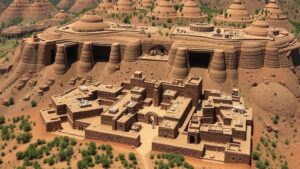Investigating the unexcavated ruins in Sudan, where entire civilizations await rediscovery.
Investigating the Unexcavated Ruins in Sudan: A Journey into Lost Civilizations
Sudan, often overshadowed by its neighbors in Africa, is a land rich with historical significance yet remains largely unexplored. Beneath the sands of the Nubian Desert lies an archaeological treasure trove where entire civilizations await rediscovery. The countrys historical landscape includes ancient kingdoms, pyramids, and ruins that highlight the complexity of human history in an area once at the crossroads of Africa and the Middle East.
The Historical Context
The history of Sudan is marked by a series of advanced civilizations that flourished long before and after the rise of Ancient Egypt. Kingdom of Kush, which thrived from 1070 BC to 350 AD, was the most prominent of these, known for its impressive pyramids and monumental architecture in regions such as Meroë and Napata. Sudan is home to over 200 pyramids, even outnumbering those found in Egypt, making it a crucial site for archaeological research.
Unexcavated Sites: A Glimpse into the Valleys of the Nile
Despite its rich history, only a small fraction of Sudan’s archaeological sites have been excavated. Notable locations like the ancient city of Meroë and the site of Kerma are just the tip of the iceberg. e are vast areas along the Nile that have yet to be explored. Each site is a potential vault of knowledge, holding artifacts, architectural wonders, and insights into the social structures of past civilizations.
- Meroë: Once the capital of the Kingdom of Kush, this site includes hundreds of pyramids–a testament to the kingdom’s power and artistry.
- Kerma: Dating back to around 2500 BC, it is one of Africas oldest urban centers and could provide valuable insights into early urbanization.
Challenges in Archaeological Exploration
Several challenges hinder the excavation efforts in Sudan. Political instability over the decades has made archaeological work difficult and dangerous. Also, climate conditions, including desertification, threaten the preservation of the unexcavated sites. Funding and support for research projects are limited, as many resources are often allocated to more immediate concerns.
The Importance of Rediscovering Sudans Civilizations
The potential findings from unexcavated ruins in Sudan are significant not only for African history but for global heritage. Understanding the dynamics between Nubian and Egyptian cultures can reveal new perspectives on trade, warfare, and social transformation. Plus, exploring these sites can contribute to the overall narrative of human civilization.
- Reshaping Historical Narratives: Rediscovery may lead to revisionist history that acknowledges the contributions of African civilizations to global heritage.
- Tourism and Economy: Increased archaeological activity can promote tourism, creating jobs and stimulating the economy.
Real-World Applications and Future Directions
A collaborative approach combining local knowledge with international archaeological expertise is vital for future excavation efforts. Promoting sustainable practices can help protect these ancient sites while allowing for scholarly research. Educational initiatives can also raise awareness about the importance of preserving Sudan’s history, fostering local pride and international interest.
Conclusion
The unexplored ruins of Sudan represent a forgotten chapter in the narrative of human history. As archaeologists and historians continue to delve into these unexcavated treasures, we can expect a gradual unveiling of rich cultural tapestries that will redefine our understanding of ancient civilizations. The journey into these hidden ruins is not merely about discovering the past but also about building a bridge to future educational, cultural, and economic opportunities.
Actionable Takeaways:
- Support initiatives that promote archaeological research in Sudan to help uncover its historical treasures.
- Encourage educational programs that focus on Sudan’s ancient civilizations, fostering greater awareness and appreciation.
- Consider participating in or contributing to heritage conservation efforts, ensuring these invaluable sites are preserved for future generations.


